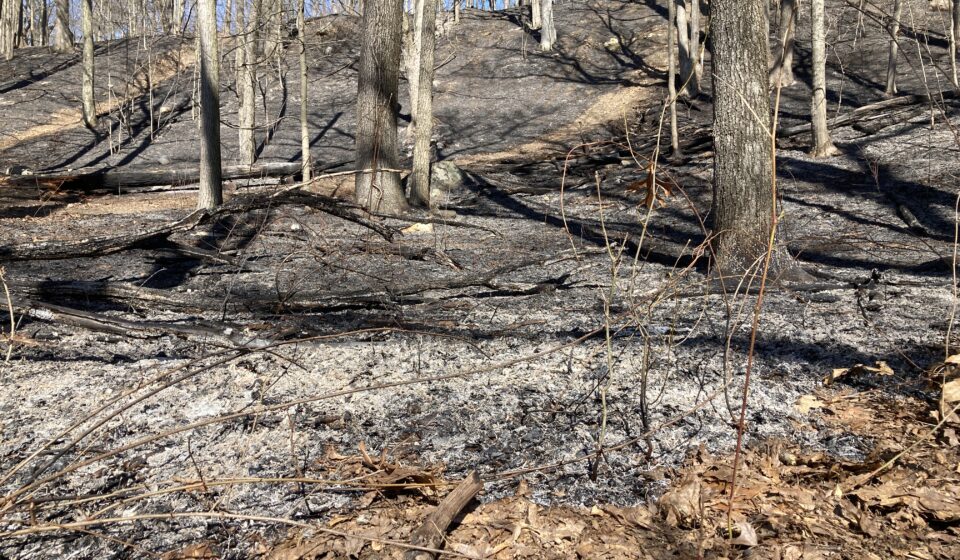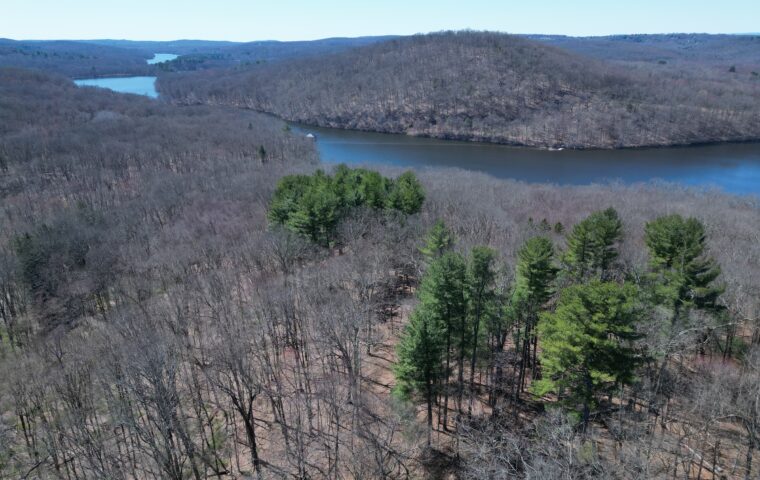
By Kara Hartigan Whelan, president of Westchester Land Trust
This letter originally appeared in The Record-Review on April 23, 2023.
On Easter Sunday, while many people were enjoying time with their families and loved ones, the stewardship team at Westchester Land Trust got a call we’ve always dreaded: one of our preserves was on fire.
Firefighters and emergency responders from nearly a dozen departments in the communities surrounding our Buttonbush Preserve in Cortlandt battled the blaze for 10 hours, beginning in early afternoon and ending after nightfall. At the peak of the brushfire, there were 50 firefighters on the scene with the assistance of a 10-wheeled tanker truck and ATVs with mounted water tanks. Thankfully, there were no injuries. The cause of the fire is still under investigation.
After surveying the damage, we estimate that approximately 5.7 acres of forest burned. We will likely lose some large tulip trees and maples, and a large swath of mountain laurel burned. Several large oaks currently appear as if they will survive.
According to the New York State Department of Environmental Conservation (NYSDEC), wildfires and brushfires are occurring more frequently, and with greater intensity, due in part to climate change causing warmer and dryer fire seasons, as well as increased development of homes and structures in heavily forested areas.
At the time of the fire, the region was under a Red Flag Warning from the NYSDEC, which is a short-term, temporary warning, indicating the presence of a dangerous combination of temperature, wind, relative humidity, fuel, or drought conditions which can contribute to new fires or rapid spread of existing fires. The state is also currently under a brush burning ban, which has been in place every March 15 through May 15 since 2010.
Although this fire could have been much worse, handling the aftermath is no small feat. Buttonbush Preserve was acquired in 2021 and isn’t yet open to the public. Our team has been busy working to repair an existing access road, design and build a trail network, improve parking, and remove hazards throughout the 137-acre property. We’re currently working to stabilize steep slopes and plan to undertake monitoring and restoration plans to track and encourage the regeneration of native plants in scorched habitats. This work will require significant staff resources and financial investment.
As part of a naturally occurring cycle, wildland fires are not inherently bad. Periodic fires can help promote growth for certain species of trees, shrubs, grasses, ferns, and wildflowers. In the case of the fire at our preserve, extensive patches of two types of invasive plants, Japanese barberry and winged euonymus, were burned, hopefully saving our team the work of eradicating these threats to native habitats.
However, fires can also result in significant loss of life, property, habitat, plants, and wildlife, particularly when they’re human-caused, as 95% of wildfires in New York are. Because our preserves are home to a wide range of wildlife, we’re exploring proactive steps to protect habitat in fire-prone areas and developing critical relationships with our local fire departments.
Westchester Land Trust is deeply grateful to the responding fire emergency departments, including the Mohegan Volunteer Fire Association, Continental Village Volunteer Fire Department, Yorktown Heights Volunteer Fire Department, Buchanan Engine Co., Putnam Valley Volunteer Fire Department, Peekskill Volunteer Ambulance Corps, Westchester County Department of Emergency Services, and Westchester County Police Department. We commend the hard work of the firefighters, many of which are volunteers who responded on a holiday. We also thank an eagle-eyed neighbor of the preserve who spotted the fire and was the first to alert our team to the situation.
Following fire safety rules and practices is crucial, not only for protecting the forests and open lands that sustain our communities, but for reducing harm to firefighters, neighbors, and wildlife as well. When you’re outside, particularly during fire season, please remember that one small action can have significant consequences for us all.






